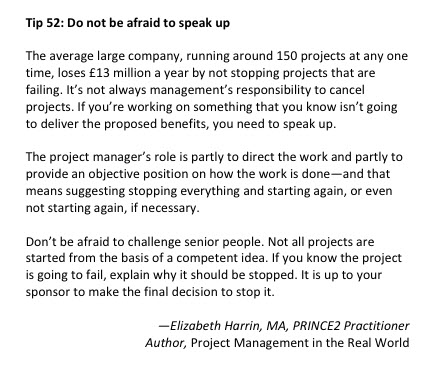Book Review: Lessons Learned in Project Management
This blog is reader-supported. When you purchase something through an affiliate link on this site, I may earn some coffee money. Thanks! Learn more.
Read our review guidelines.
Lessons Learned in Project Management: 140 Tips in 140 Words or Less is a compilation of tips from project managers around the world, plus a healthy dose of advice from the book’s compiler, John A. Estrella.
The preface explains how he was struck by the idea of gathering Twitter-style words of wisdom and making a book out of them.
The book might be Twitter-inspired but the tips are 140 words, not 140 characters. This at least means that the authors are able to make their point in a paragraph or so, and it certainly makes it easier to read. There are actually 145 tips, as there is a section of bonus tips at the end.
The tips don’t appear to be organized in any particular order. The book is not split into themes, or ordered by contributor name. Consequently, it is not a book to read cover to cover, but rather to dip into when you need inspiration.
Given the lack of thematic structure, it would be difficult to find relevant tips when you hit project issues – just open the book at a random place and hope that you’ll be inspired out of the difficulties you are in.
Having said that, if you can wade through the tips some of them are excellent. This, for example, from Pawel Brodzinski:
Acting according to schema, although safe, isn’t always the best possible option. Because you normally have access to data about the issues, gather all of the facts while forgetting for a moment the limitations of your methodology. Based on the information, you can then make the best possible decision. Common sense often yields the best possible strategy. Use it whenever standard procedures don’t suit your situation well enough.
And this, from Ana Maria Rodriguez:
How much detail should you put into your plan? Do not plan details that you will not be able to monitor, or will not be interested in monitoring during project execution. Do plan details that will require monitoring and controlling later. Keep in mind that you will need to get update information on them later in the project life cycle.
Quite a lot of the tips cover organizational politics, which confirms that the thing project managers learn over time is not how to use new tools for tracking risks or calculating estimates, but how people tick.
I found this too when I was researching my own book, Project Management in the Real World. We get better at being project managers because we learn how people operate.
Over half the tips come from Estrella himself and these are a mix of his own experience, in story form, and adaptations of conversations with others or books that he has read. He has a particularly interesting point to share about delegation, which he calls “the ask.”
When delegating tasks to team members, be explicit on what you are “asking” them to do. Do you want them to review the documents and provide feedback, or do you want them to edit and finalize the documents? Instead of simply forwarding the email with an FYI, tell them what to do with it -“no action is needed” or “add a calendar reminder.” A clear “ask” can expedite the completion of tasks.
There are also some good suggestions for no cost
I was one of those other contributors who shared my lessons learned, and here is my tip from the book:
The average large company, running around 150 projects at any one time, loses £13m a year by not stopping projects that are failing. It’s not always management’s responsibility to cancel projects.if you’re working on something that you know isn’t going to deliver the proposed benefits, you need to speak up. The project manager’s role is partly to direct the work and partly to provide an objective position on how the work is done – and that means stopping everything and starting again, or even not starting again, if necessary. Don’t be afraid to challenge senior people. Not all projects are started from the basis of a competent idea. If you know that a project is going to fail, explain why it should be stopped. It is up to your sponsor to make the final decision to stop it.
What tips would you add?


